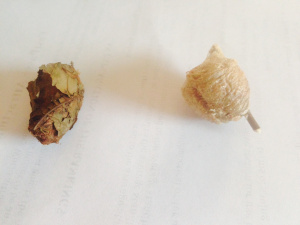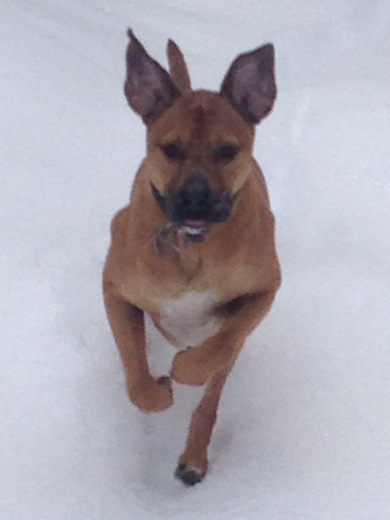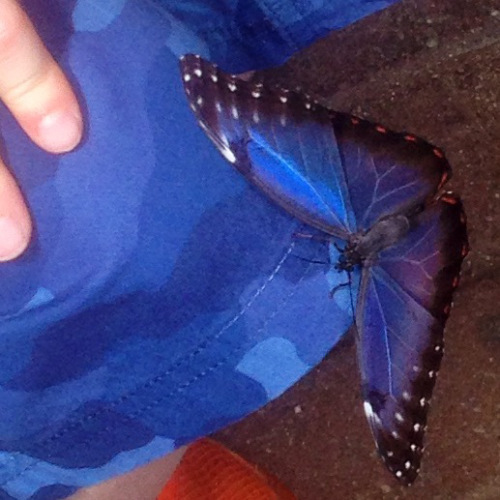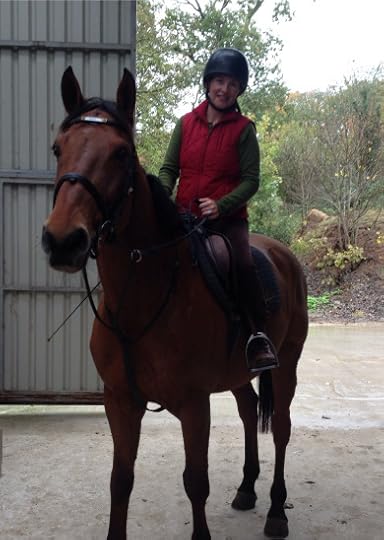Liz Michalski's Blog, page 3
May 13, 2014
It’s Not Them. It’s You.

NOT the Slobbering Beast, although we are working on exactly this.
When I used to show my dog in the obedience ring, I had a joke with a friend. If a dog sat when he was supposed to down, wandered off when heeling, or jumped out of the ring to snag a jelly donut (before jumping back in!) it was ‘handler’s error.’ Translation: my fault.
My riding instructor said something similar this week. There are three of us taking classes together, all of us middle-aged, at different levels of experience and with very different horses. We are all having different problems, and the ray of sunshine that is my current instructor blamed it all on us. If the horse isn’t doing what you want it to do, she said, it’s your fault.
Either you aren’t communicating clearly enough what it is you want, you haven’t schooled on that particular issue enough, or you haven’t made it evident just how important this action is to you and committed to following through with appropriate consequences when your request isn’t met.
There are exceptions, of course — there always are — but in general, to be a good trainer or rider, you need to look in the mirror when things aren’t going your way.
It’s the same with publishing.
At Grub Street’s Muse and the Marketplace two weekends ago, I heard the same message over and over and OVER again from the published writers who were teaching classes: There’s always a way to get better. There’s always a way to improve. There’s always room to make your dialogue sharper, your plot more intense, your characters more believable.
Agents want to say yes.They need to say yes — their income depends on finding that next sellable book.
Editors want to say yes. They want a book that keeps them up at night, that makes them go past their stop on the subway, that has their whole department buzzing.
If they aren’t saying yes, there’s a reason.
There are exceptions, of course — there always are — but in general, to be a good writer, you need to look in the mirror when things aren’t going your way. You need to own what you can control, need to work it as hard as you can, so that if a ‘no’ comes your way, you know it’s not because of you, because YOUR writing is tight, YOUR dialogue sparkles, YOUR plot is heart-poundingly intense.
To paraphrase writer Matt Bell (who does so many revisions on his novels he made my head hurt) you have to be in it for the work, not the glory, because the glory may never come.
Do the work.

April 29, 2014
Spring in New England
 New Englanders are a reserved bunch. My sister-in-law down South moved to a new home at the same time I moved to where I live now. Within a week, she had five pies on her doorstep. Here, it took me three months to meet my first neighbor.
New Englanders are a reserved bunch. My sister-in-law down South moved to a new home at the same time I moved to where I live now. Within a week, she had five pies on her doorstep. Here, it took me three months to meet my first neighbor.
Which is why spring in New England is so important. It’s the time of year when we get a little giddy, when we throw caution to the wind, when our faith through the dark winter days is rewarded. This morning I drove past a house I’ve gone by almost every single day since September, a tiny nondescript ranch a long way from better times. But I’m not sure I’ve ever really seen it before today, when the front yard was a riot of color, brilliant sunshine yellow daffodils against the bright pink of cherry blossoms.
Someone had to plant each one of those bulbs, digging down into the hardening earth, had to imagine how the flowers would look against a tree decked in its finest. I hope the thought gave them a quiet chuckle, hope it helped them get through what seemed like an endless winter. It’s a gray day here today, but I’m carrying that image with me as a promise that spring is really here, even if there’s not much evidence yet.
Because sometimes all you can do is hope for better, more brilliant times, for something lovely to awaken from the darkness.

What, you don’t have a luna moth chrysalis and praying mantis egg sac hanging around your house, waiting to hatch?

April 22, 2014
April 15, 2014
Naming of Parts — Odds Are
I was going to link to this poem today — it is one of my favorites and I try to read it every spring. But it is gray and rainy here, so I thought we needed something more upbeat.
In my family, I am notorious for becoming infatuated with a song and playing it obsessively, until EVERYONE including the Slobbering Beast groans when they hear the first few notes. (My son recently reminded my husband how lucky he was not to carpool with us in the morning because “You don’t have to hear about Jane and that dude wearing a corset all the time. Which is just weird.” Lou Reed, wherever you are, I salute you.)
But sometimes I hit on a winner, like this one. It has become our morning wake-up song, our roll down the windows and sing on the way home from school song, our dance around the kitchen after dinner song. Play it a few hundred times — it grows on you. (And read the ticker tape at the bottom if you need a laugh.)
Enjoy.

April 8, 2014
Riding (And Revising) With Ghosts
I’ve been riding horses, off and on, since I got my first paycheck out of college. One of the reasons I can still get on and (kind of) giddyup after years away from the barn is because I had great instructors. No matter how high my rent was, or what odd expenses came my way, I almost always managed to scrape together the money for a weekly lesson. One woman I rode with for over 10 years — she helped me find the first horse I ever owned free and clear, she taught me how to fall, she even came to my wedding, one of the few times I saw her dressed in something other than boots and breeches.
Another instructor helped me regain my confidence after some bad falls. She taught me how to observe what the horse was saying, not just what I wanted him to do. A third found me my dream horse and went out of her way to bring us together. Although there were other teachers, these three are the ones who mattered the most.
I’ve moved on from that part of my life, but I still remember them all every time I climb into a saddle, and at other moments as well. I learned so much from them, some of it about riding, most of it not.
My new instructor is funny and sharp, with her own ways of teaching, her own equine hangups. She’s threatening to get a video camera system, so she can show those of us in her class how we really look, not just how we appear in our own heads. And it’s true — the way we think we ride, straight and tall, loose and limber, isn’t the reality at all. This week, something she said reminded me of an exchange I had a long time ago with my first instructor, who had seated me on a horse that was ready to leave the ground at any moment. She kept telling me to turn him in circles and not to throw away my outside rein. After the fifth or sixth time, I remember snapping that I was using the outside rein just #$#$ fine, thankyouverymuch.
“Well the horse disagrees,” she snapped back. “And so do I.”
In my last lesson, the current instructor was trying to help me get the horse on the bit going forward, and suddenly, I could hear the old instructor yelling at me not to give away that rein. From the distance of 10 years or so, it suddenly made perfect sense. So I shortened up the rein when I was turning, kept the tension in it as we circled, and voila! I had a horse on the bit, moving forward nicely. (At least, that’s what I’m choosing to believe in lieu of videotaped evidence.)
Revisions in writing can be a bit like riding. How you think it looks, how it appears in your own head, can be radically different from what is actually on the page. If you have beta readers, resist the urge to tell them “That’s exactly what I’ve done,” if they suggest you need to tighten up the plot, increase the love interest, or ground it in a more realistic setting. Remind yourself that you’ve asked for their advice because you have respect for their abilities and judgement. Say “thank you” to them and as little as possible of anything else. Then put their comments away, along with your manuscript, for as long as you possibly can.
When you come back to it with fresh eyes, you just may see that they were right.

Such bad form, but such a happy girl!

March 11, 2014
Peas and Publishing
Last week I was sitting on Rory, listening to my instructor correct some point or other in my riding, and another person in the class commented on what a lovely head set Rory had as he stood there. His head and spine were perfectly rounded, he was mouthing the bit, and he looked like a real dressage horse, instead of a get up and go hunter. (Like this, if you are looking for a visual.)
“I know,” I said. “I can get him to relax into it when we’re stopped, but not when we’re trotting.”
You know how the second the words come out of your mouth, you regret them? I should know better to ever, EVER tell a riding instructor I can’t do something, because they will take it personally. They will devote the rest of their lives to making sure that I can. Or at least the rest of the lesson. And this instructor is no different.
“Of course you can,” she said immediately. And I silently cursed the person who had commented as I dutifully went off at the trot to get Rory on the bit.
But here’s the thing. People call riding a conversation, and it really is. No matter how big and powerful you are, no matter how harsh your aids, you cannot make a horse do something he doesn’t want to do. You may prevail for a while, you may get your way that day, or the next, maybe even the third, but at some point in time there is going to come a reckoning, and it is not going to be an attractive one.
Instead it’s like getting a three-year-old to eat their peas. You ask nicely. You mix them with a bit of honey, maybe, and you’re not surprised when they come back at you. You give it some room and you ask again. You mix them with carrots, you use them frozen to soothe sore gums, and eventually, if you’re persistent and you really, really want it, you have a three-year-old who will eat peas.
Let us say that Rory does not like peas in any way, shape, or form. We’d had this conversation on our own, with me kind of suggesting, in a timid way, that he might want to try them, and him spitting them back out at me hard. No peas for him, I’d decided.
Because the other part of the conversation of riding is that once you ask a horse for something, you have to follow through. You have to mean it, to really commit, because if you don’t, then the horse has just learned that he doesn’t have to respect you. That you aren’t serious about this, and he can ignore whatever other suggestions you might have, which can get dicey when you’re outside and you ask him to pay attention to you, not to whatever is blowing in the breeze, or when you ask him to go over a jump.
But here was my instructor, telling me to give Rory some peas, telling me I was capable of doing this, that I NEEDED to do this. So I swallowed hard, and started the conversation.
It went about like you’d expect. Rory huffed and puffed and behaved a little bit like a punk, tossing his head hard at me and stomping sideways. It wasn’t a full-scale temper tantrum, just a little bitty one, the equivalent of a toddler dumping his dish on the floor. No real malice, just curiosity about what would happen. Nothing personal.
“You can do this,” my instructor said. “And if it helps, I’ve never known him to buck.” It didn’t help one bit, since I have a mortal fear of bucking based on past painful experience, and whenever anyone says that it’s the equivalent of saying the Titanic had plenty of life boats.
But I stayed with it, despite the huffing and puffing. I breathed and unfroze myself from the self-protective frame I’d immediately folded into. I kept asking, nicely, and eventually Rory got tired of putting on a show. He recognized that I meant it, and he dropped his head, rounded his frame, and looked a little bit like a dressage rock star.
After, my instructor took me aside and reminded me that I had the skill to do this. I had the talent, even if I hadn’t used it in a decade. That I should be able to get on a horse even after 10 years and politely and firmly explain what we were going to do, and then do it. That it’s not just skill, but self-confidence too.
Publishing is a very similar conversation. You can’t make an agent take you, you can’t make a publishing house buy your book. You can’t make readers fall in love with your story. But you can be prepared. You can be as skilled as you possibly can be before you start that conversation. You can commit all the way to making it happen, to getting better and better, to not taking the rejection personally, but to getting back to a place of strength for the next time you ask. And the time after that. And every single time going forward. Until at last, you get that yes.

My little girl on my big sweet non-punk horse.

March 4, 2014
Nostalgia
I went to the preschool today and remembered how much I loved this quote when my children went there, so I thought I’d share it with you.
“The most effective kind of education is that a child should play amongst lovely things.”
Plato
I wish all the children of the world were so fortunate.

February 25, 2014
Pick One Thing
Lately when riding, I am a hot mess. (That’s the technical term. The actual term used by my instructor is unprintable here.) There are so many things going on — my seat isn’t balanced, my legs slide forward, my knees are jammed up against the knee roll, my reins get floppy — hence, the hot mess. (In fairness to my past riding self, it’s not all bad all the time — but compared to how I used to be, it certainly feels that way.)
This week, my instructor brought me back to basics. She took a long whip, threaded it between my elbows and behind my back, and told me to keep it there while cantering. Lean forward and hunch your shoulders toward your ears (my favorite riding position, apparently) and the whip pops out. Humiliation galore. (And an exciting ride if it happens to hit your horse on the way down.)
It’s an old trick, but it worked. To keep the whip in place, I had to roll my shoulders down and lean back. Which centered my seat. Which fixed my leg. Which got my hands out of my lap and improved the way I held the reins.
One small change, and everything fell into place.
Writing is like that too. Looking at an entire manuscript is overwhelming and can make you feel like a failure. But if you pick just one thing to work on — your dialogue, for example, or the way you transition between scenes — one of two things will happen:
Either you’ll fix the main problem, and everything else will snap into place, or…
You’ll find out you have more work to do. Which isn’t the end of the world, I promise. It just means picking the next one thing. Fixing that. And moving on.
(And if you’ve read this far, here’s a reward — one of my favorite riding videos is at the end of this page.)

February 18, 2014
Hiding in Plain Sight
Last week, after one of the constant snow storms, the Slobbering Beast and I were lucky enough to be the first ones on the trail. No car tracks at the main entrance, no boot marks anywhere. Bliss. We hiked in silence, the only noise the creaking of the trees, the crash of ice and of snow sliding off a branch. We took a side trail, not the main one, and about 15 minutes in the snow was covered in tracks. Small prints — mice or maybe chipmunks — hand-like prints that could have been raccoon or skunk, and then, far off on the rocks, a large dog-like paw print with no human tracks in sight. We didn’t linger near that one.
The Slobbering Beast was in his glory, running this way and that, investigating every scent. It was a reminder to me that the woods are like this for him every time, full of invisible residents. They are there always, even when I can’t see the signs of their presence.
Stories are like that too, I think. All around us, hiding in plain sight, invisible until there’s a shift in our thinking, a catalyst to change how we view the world. Then they reveal themselves, ready at last to be told.
What stories will you see today?

Happy dog










